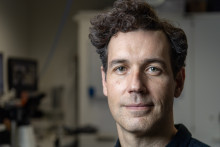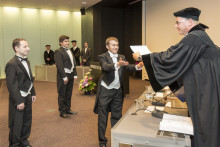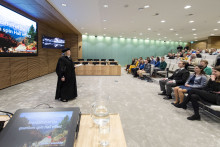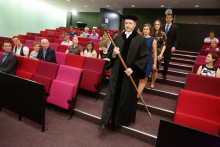This title sounds like a clickbait, and you are kind of right. My personal recipe for becoming an academic leader is pretty simple: the only way to become an academic leader is to be an academic leader. But hold on, in the following lines I will disentangle this conundrum and I will also point out two important obstacles that might stand in your way if you want to become an academic leader.
Requirements for a ‘leadership profile’ and ‘leadership skills’ are quite common in academic job openings or promotions (e.g., in UT’s Talent Development Map 2.0 and in UT’s tenure track memorandum’s policy document). However, the concept of ‘academic leadership’ is notably challenging to define. Mostly, academic leadership is related with academic administrative positions. In this definition, academic leadership is a service that one is doing to the academic community.
It is often a cyclic obligation that most members of the community eventually assume. Some take that kind of job temporarily, which might be full time or part time, and then go back to their pre-leader life. Other academic members decide to dedicate the rest of their professional life to this job. It makes sense to call this an ‘academic service’, since an academic leader sacrifices research and teaching time for the academic community. But, if we are talking about ‘academic service’, how can one develop a ‘leadership profile’ or a ‘service profile’? In this sense, academic leadership skills are rather management and social skills. I guess one could take courses to reflect on those skills, but it takes quite a leap to assume that management and social skills are all what a leader needs.
Everyone surely agrees that the best way to develop such a leadership profile is to do your duty for the community and learn it by doing. But here comes the first problem: quite often one is elected, chosen, or voted for these kinds of positions. So, it is not that obvious how to develop a profile in this sense. We should also look at this from a different perspective. Given the visibility that such positions offer, perhaps we should leave these positions to those in our academic community that need more visibility. They are also representing our community, so what image do we want to give? We just stumbled into another obstacle: perhaps becoming an academic leader should not be a personal choice, but a choice from the academic community.
But there are other definitions of academic leadership. Another perspective of an academic leader is of someone that can lead a research group successfully. This is often measured by how good your team develops and how good the PhD dissertations are promoted under your supervision. Nobody can argue that it requires experience to learn to lead a research team. When one is asked for a ‘leadership profile’ in this sense, one is asked for experience in leading and managing a team of students and postdocs. Here comes the next obstacle: that can be difficult in the Netherlands since the right of promotion (ius promovendi), i.e. the right to be convey a doctoral degree to students, is generally something only gained as full professor (hoogleraar and some universitair hoofddocenten at the UT).
This defines pretty much a conundrum: young academics are being asked to perform as leaders without the right of such. This is not the case in neighboring countries as in Belgium, France or even Germany, where the ius promovendi is granted to all ‘professors’, assistant profs and beyond. It is a good moment to remind everyone that KNAW’s Jonge Akademie declared 2023 as the ‘iedereen professor jaar’ at a national level. Recently this year, a proposal plan was sent to the UT’s doctorate board from the Young Academy Twente to consider the extension of such a right. It was not received with much enthusiasm, as you can read in a recent article in U-Today.
We are essentially in a vicious circle in which certain competence is being demanded from the younger academic staff to be promoted to a higher position, but the only way to gain those skills and experience is precisely by taking those positions. Academic leadership in academia is rather a recognition from the academic community and then it develops over a career. If an academic institution demands academic leaders, it should first allow its younger members to be leaders. It is precisely by giving them greater responsibility that young academics will be able to develop the relevant leadership qualities. Instead of demanding further training, academic institutions should put trust in their younger academic staff and just make them academic leaders.
Alvaro Marin is an associate professor in the Physics of Fluids (POF) research group at the UT. If you would like to respond to this article, or perhaps write an opinion article yourself, please send us an email via [email protected].







